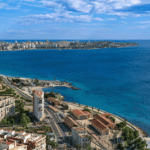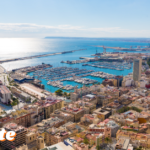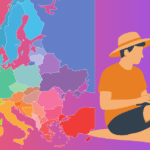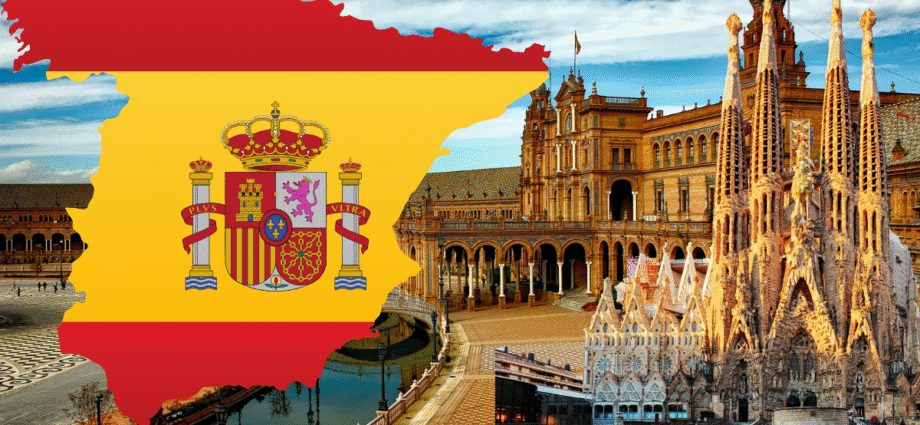Summary
- Spain’s Digital Nomad Visa (DNV), introduced under the framework of Law 28/2022, known as the Startup Law, represents a significant shift in the country’s immigration policy.
- This legislative initiative is not merely a tool for attracting foreign talent but is a cornerstone of a broader national strategy to foster an innovative, high-growth economy.
- The DNV provides a clear, formal pathway for non-European Union (EU) remote workers to live and work in Spain legally, a notable departure from the previously restrictive Non-Lucrative Visa that prohibited remote work.
This guide offers a comprehensive analysis of the DNV’s requirements, a step-by-step guide to the application process, and a critical examination of the post-arrival obligations, including nuanced insights into the tax and social security landscape.
The information herein is designed to go beyond a simple checklist, providing the crucial context and strategic understanding necessary for a successful application and sustained residency.
Part I: Eligibility and Foundational Requirements
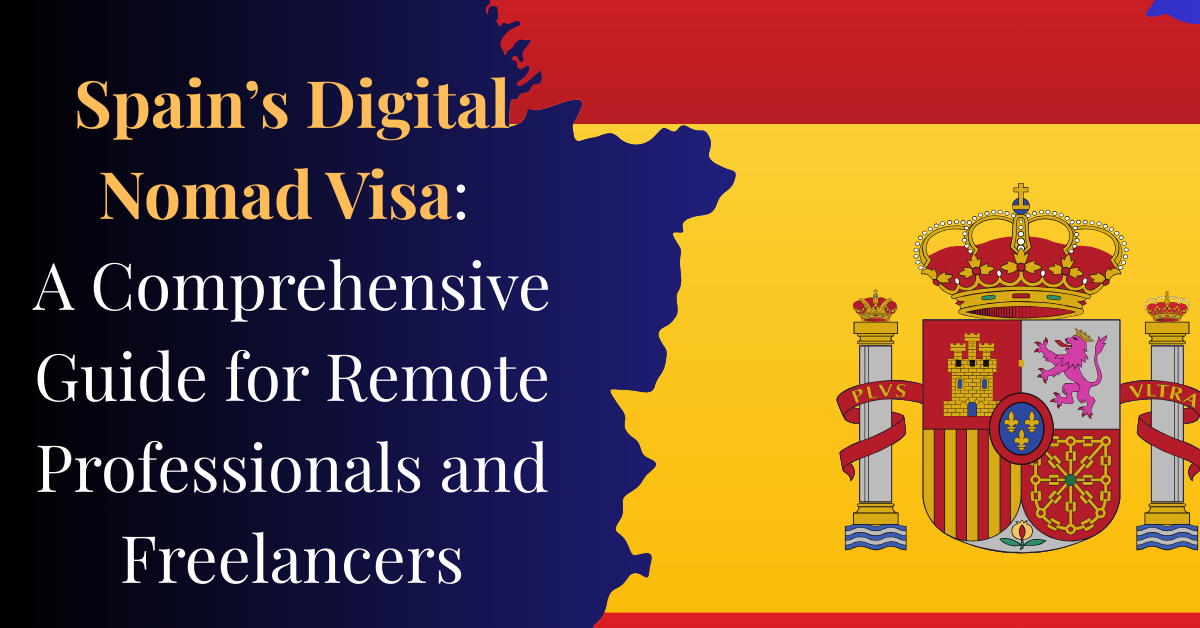
Who Qualifies? Applicant Profiles and Restrictions
The Spanish Digital Nomad Visa is designed for a specific demographic of international professionals. Eligibility is primarily categorized into three profiles, each with distinct requirements.
The first profile is the Remote Employee. This individual must possess a valid, formal employment contract with a company located outside of Spain.
A key requirement is that the employment relationship must have existed for at least three months prior to the submission of the application. This provides a baseline for a stable, long-term working relationship.
The second profile is the Freelancer or Contractor. This professional must provide services to foreign clients and demonstrate a minimum of three months of professional activity.
A critical, and often misunderstood, distinction is that freelancers on this visa are permitted to work for a company located in Spain, but this local work cannot exceed 20% of their total professional activity. This rule ensures the visa remains focused on attracting international talent and prevents full integration into the local labor market.
The third profile is the Digital Entrepreneur. This category is for individuals who own a business established outside of Spain for at least one year. They must be able to prove their status as a business owner and demonstrate the financial stability of their company to support their residency in Spain.
The Financial Threshold: Meeting Minimum Income Requirements
A non-negotiable component of the DNV application is demonstrating sufficient financial resources. The minimum monthly income is directly tied to a multiple of Spain’s Minimum Interprofessional Wage (SMI). For the year 2025, the baseline monthly income required for a single applicant is approximately €2,763, which is 200% of the SMI.
For applicants seeking to bring family members, additional income must be proven. For a spouse or a de facto partner, the applicant must show an additional 75% of the SMI, or approximately €1,063 per month. For each additional child, a further 25% of the SMI is required, which amounts to roughly €345 per month.
The verification of this income has become a central point of scrutiny by Spanish authorities. The primary objective of the DNV is to generate tax and social security revenue for Spain. Consequently, the income requirement is not an arbitrary figure but a financial model designed to ensure that applicants are self-sufficient and can contribute to the economy without becoming a burden on public services. The government, through the Unidad de Grandes Empresas y Colectivos Estratégicos (UGE), has tightened the rules for acceptable income documentation.
While simple bank statements and employer letters were once sufficient, authorities now demand official, third-party verified documents such as tax returns (e.g., Form 1099 or W-2) and social security reports from the applicant’s country of origin. This shift in policy is a deliberate move to close previous loopholes where applicants could show a temporary windfall rather than a consistent, sustainable income stream.
Professional and Legal Credentials
Beyond financial solvency, applicants must meet specific professional and legal criteria.
Proof of Experience: An applicant must demonstrate they are a highly qualified professional. This can be done by providing a copy of a university, undergraduate, or postgraduate degree. Alternatively, if the applicant does not hold a degree, they must provide documentation proving at least three years of professional experience in their field. As with financial documentation, the verification process for professional experience has been made more rigorous. Simple letters from past employers are no longer sufficient; they must be accompanied by official records such as Social Security reports or tax documents to ensure authenticity.
The Clean Criminal Record: Applicants must submit a criminal background check from their country of residence and any other country where they have resided in the last two to five years. This document must be recent, typically issued within the last six months, and authenticated with a Hague Apostille. It must also be accompanied by an official translation into Spanish by a sworn translator.
Mandatory Health Insurance: All applicants must provide proof of private health insurance that is valid in Spain. The policy must cover all risks insured by the Spanish public health system and have no co-pay or waiting period. This requirement is intended to prevent the DNV holder from being a financial liability on Spain’s public health system.
Part II: The Application Process: A Step-by-Step Walkthrough
The Spanish DNV offers two distinct application routes, each with its own timeline and specific procedures. The choice of route can significantly impact the initial validity of the residence permit and the speed of approval.
Choosing Your Route: Consular Visa vs. In-Country Residence Permit
Consular Visa (from a home country): This is the conventional route, where an applicant submits their visa application to the Spanish consulate in their country of legal residence. The process is more time-consuming, with typical processing times ranging from one to three months. If approved, the applicant is granted a one-year visa, after which they must apply for a three-year residence permit from within Spain.
In-Country Residence Permit (from within Spain): This accelerated route is available to individuals already in Spain legally, for example, on a tourist visa. The application is submitted to the UGE, the government body responsible for processing visas for strategic professionals. This route offers a significantly faster processing time, with a legal period for a decision of approximately 20 business days. The permit, if approved, is initially valid for three years.
The Master Document Checklist
Regardless of the chosen route, the application requires a meticulous assembly of documents. A single missing or incorrectly formatted document can lead to denial. The following is a consolidated checklist based on consular requirements :
- Application Form: A completed and signed National Visa Application form or MI-TIE form.
- Passport and Photos: A valid passport with at least one year of validity remaining and two blank pages, along with two recent, passport-sized color photos.
- Proof of Legal Residence: For non-U.S. citizens applying from the U.S., a photocopy of a valid U.S. long-term visa or a notarized copy of a Green Card is required.
- Proof of Remote Work: This includes an employment contract for remote employees or client agreements and invoices for freelancers. For business owners, documents of company incorporation and proof of at least one year of continuous activity are necessary.
- Financial Means: Documents demonstrating sufficient income, such as bank statements and recent payslips, must be provided.
- Criminal Background Check: An FBI criminal background check is required, issued within the last six months, and authenticated with a Hague Apostille. A responsible declaration of no criminal records in countries of residence for the last five years is also mandatory.
- Health Insurance: Proof of a health insurance policy from a company authorized to operate in Spain, with no co-payments or waiting periods.
- Social Security Coverage: Documentation of social security coverage is required, either from a home country (for those with a bilateral agreement) or proof of registration with the Spanish Social Security system.
- Academic Qualifications: A university degree or documentation proving at least three years of professional experience must be provided.
- Motivational Letter: A written statement explaining the reason for relocating to Spain and how the applicant will support themselves.
- Family Documents: For dependents, proof of the family relationship (e.g., marriage or birth certificates) is required.
The Role of Apostilles, Translations, and Consular Jurisdiction
A crucial step in the document preparation process is the authentication and translation of foreign documents. Official documents, such as criminal background checks and marriage or birth certificates, must be authenticated with a Hague Apostille. This process validates the document’s authenticity for use abroad.
Additionally, these documents, along with any foreign-language certifications, must be translated into Spanish by a sworn/certified translator. The specific consular district where the application is submitted may have slight variations in document requirements, so it is essential to consult the consulate’s official website.
Part III: Post-Arrival: From Visa to Residency
Obtaining a DNV is not the final step; it is the gateway to a series of mandatory post-arrival obligations that formalize one’s legal residency in Spain.
The TIE Card: Your Foreigner’s Identity Card
The visa or residence permit is just the beginning of the legal residency process. The final step is obtaining the Tarjeta de Identidad de Extranjero (TIE), a physical biometric card that serves as a foreigner’s identity card. This card certifies legal status and contains the applicant’s Foreign Identification Number (NIE), permit type, and a photo.
The process of obtaining the TIE card is a separate bureaucratic procedure with its own set of rules and deadlines. Applicants are legally required to apply for the TIE within 30 days of their arrival in Spain. The application process involves booking an online appointment with the police, which can be challenging due to high demand in cities like Barcelona, and requires a working Spanish mobile number to receive a confirmation code. It is a high-stakes final step where a single error, such as submitting an outdated proof of residence (empadronamiento) or missing a deadline, can invalidate the entire process.
Social Security: Your New Legal Obligation
Once in Spain, digital nomads must register with the Spanish Social Security system and begin making contributions. This is a fundamental requirement of the visa, as it is a work-based permit, and a core tenet is that visa holders contribute to the Spanish economy in exchange for residency.
For remote employees, this may involve registration through their employer, while freelancers and contractors must register as an autónomo (self-employed worker).
Compliance with Social Security is mandatory, and a failure to do so can lead to legal consequences and potential visa revocation.
For freelancers, the autónomo registration formalizes their contract with the state, providing access to public healthcare, state pension, and other benefits in exchange for mandatory monthly contributions. New freelancers can benefit from a reduced flat rate for the first year, after which contributions are based on a sliding scale tied to their monthly earnings.
Part IV: The Financial Landscape: Tax and Social Security in Depth
A critical, and often complex, aspect of the DNV is navigating the Spanish tax system. Applicants face a choice between two primary tax regimes, each with distinct benefits and limitations.
The Beckham Law: Benefits and Major Caveats
The Beckham Law, officially known as Ley 35/2006, is a special tax regime that was designed to attract highly qualified foreign talent to Spain. It allows eligible newcomers to pay a flat 24% tax rate on their Spanish-sourced income up to €600,000 for up to six years.
A significant benefit of this regime is that most foreign-sourced income, including income from investments, dividends, and rental properties abroad, is exempt from Spanish taxation.
However, the application of the Beckham Law for digital nomads, particularly freelancers, is a subject of considerable debate and risk. While some sources suggest that digital nomads can qualify, other expert forums and legal opinions warn that the law is primarily geared toward individuals with a formal employment contract from a Spanish company or a qualifying startup.
For a freelancer operating as a sole proprietor or through a foreign LLC, the Spanish Tax Authority (STA) may not view their situation as a “relocation for an employment contract”.
There is evidence that the STA has engaged in retroactive audits and “bait-and-switch” tactics, initially approving applicants for the Beckham Law only to later rescind the benefits and demand years of back taxes and penalties.
This poses a significant financial risk. The allure of the flat tax rate must be weighed against the potential for an intrusive investigation and a demand for retroactive payments. A freelancer’s ability to deduct business expenses under the standard tax system may make it a more favorable, and less risky, option.
Spain’s Standard Progressive Tax System (IRPF)
For those who do not qualify for or choose not to elect the Beckham Law, Spain’s standard progressive tax system, known as Impuesto sobre la Renta de las Personas Físicas (IRPF), applies. Under this system, tax rates range from 19% to 47% depending on the individual’s income. As residents, individuals are required to pay taxes on their worldwide income, not just Spanish-sourced income.
A key advantage of the IRPF system for freelancers (autónomos) is the ability to deduct business-related expenses, such as office rent, utilities, and social security contributions, from their taxable income. Additionally, a portion of private health insurance costs for the applicant and their family can be deducted. For a remote worker with a lower-to-mid-range income and significant business deductions, the progressive
IRPF system can sometimes result in a lower effective tax rate than the flat-rate Beckham Law.
The following table provides a clear comparison of the two tax regimes:
| Tax Regime | Flat Rate | Tax on Foreign Income | Duration | Deductions Allowed | Ideal Candidate Profile |
| Beckham Law | 24% (up to €600,000) | Generally exempt | Up to 6 years | Limited to none | High earners with foreign passive income; employees with a formal Spanish job offer |
| IRPF (Standard) | Progressive (19%–47%) | Taxable | Indefinite | Yes (business, social security, health insurance) | Freelancers with many deductions; lower-to-mid earners; long-term residents |
Part V: Strategic Insights and Common Reasons for Denial
The DNV application process is not static; it is an evolving system that has responded to challenges and common applicant errors.
Income Verification: A Stricter Approach
Authorities have become significantly more stringent in their verification of financial stability. The shift from accepting simple letters and bank statements to requiring official tax returns and social security reports is a direct consequence of a previous loophole.
Some applicants were exploiting the initial, more lenient rules by creating a “ready-made company” to pay themselves for three months, thereby meeting the income requirement without a genuine, long-term business model.
The UGE is now actively scrutinizing applicant-owned companies and may request additional documentation, such as the company’s latest tax return or proof of investment in production assets, to verify its financial strength and legitimacy.
The Evolving Bureaucracy: Lessons from the Frontline
The application process is not only rigorous but can also be influenced by an unpredictable human element. The system can be unforgiving, and the burden of proof is always on the applicant.
Denials can occur for seemingly minor issues or even for inexplicable reasons, such as during holiday periods.
The legal period for a decision on an in-country application is 20 days, but the authorities can request additional documents, giving the applicant a tight, 10-day window to respond. A missed notification, for which applicants are not always alerted by email, can lead to the application being automatically archived.
This highlights the need for meticulous preparation and a proactive approach to checking application status daily, or working with a specialist who does so.
A story of a client being denied for an old drinking offense only to be approved with the exact same documents upon reapplication in the new year demonstrates the system’s occasional illogical nature and the importance of persistence with a flawless application.
Part VI: Spain in Context: A European Comparison
For many remote professionals, Spain’s DNV is just one of several options for establishing a base in Europe. A comparative overview with Portugal’s D7 Visa and Italy’s Digital Nomad Visa provides a broader strategic perspective.
Spain vs. Portugal’s D7 Visa
Spain’s DNV is specifically for active remote workers, whereas Portugal’s D7 Visa is primarily for individuals with a steady source of passive income, such as from pensions or rentals. Portugal’s income threshold is also significantly lower, approximately €870 per month for a single applicant. A notable difference in long-term goals is the path to citizenship: Portugal offers a faster route after five years of legal residency, compared to Spain’s standard ten-year requirement (though this can be shortened for Latin American citizens).
Spain vs. Italy’s Digital Nomad Visa
Spain’s DNV offers a significantly faster processing time, with in-country applications potentially approved in as little as 20 business days. Italy’s visa can take between 60 to 120 days to process and requires applicants to secure a one-year lease agreement before the application. While Spain allows both in-country and consular applications, Italy typically requires the application to be submitted from the applicant’s home country. The tax implications are also different. Spain’s
Beckham Law may be more appealing for high-earning employees, while Italy’s Forfettario regime, which offers a 5% flat rate on 70% of income for five years, may be more attractive to freelancers.
This comparative analysis demonstrates that Spain’s DNV is an attractive option for those who want a fast-track, work-focused residency without the immediate long-term commitment of a rental lease. However, the final decision often comes down to an individual’s financial profile and long-term tax strategy.
| Criteria | Spain | Italy | Portugal (D7) |
| Income Requirement | ~€2,763/month | ~€2,333/month (€28,000/year) | ~€870/month |
| Application Location | In-country or consulate | Consulate only | Consulate only |
| Processing Time | Fast-track 20 days (in-country) or 1–3 months (consulate) | 60–120 days | 2–3 months |
| Primary Tax Regime | Beckham Law (24% flat) or IRPF (progressive) | Forfettario (5%–15% on 70% of income) or progressive rates | Progressive rates with potential NHR benefits |
| Target Applicant | Remote employees, freelancers, and entrepreneurs | Highly qualified professionals (employees and freelancers) | Retirees, individuals with passive income, remote workers |
| Path to Citizenship | 10 years (2 for LatAm nationals) | 10 years | 5 years |
| Accommodation | Not required for visa application | One-year lease required | Confirmed address required (lease or letter) |
Conclusion: A Final Word of Expert Advice
Spain’s Digital Nomad Visa is a powerful and viable option for remote professionals seeking a long-term base in Europe. It represents a progressive step by the Spanish government to embrace the global digital economy. However, the success of an application and the sustainability of residency depend on a nuanced understanding of the evolving legal and financial framework.
The analysis reveals that the DNV is a contract with the Spanish state: a legal framework that provides a stable residency in exchange for economic contribution. It is not a passive lifestyle choice but a legally binding commitment to the tax and social security systems. The increasing stringency in documentation, particularly for income and professional experience, is a direct response to past attempts to circumvent the spirit of the law.
For any prospective applicant, the most crucial recommendation is to approach the process with meticulous preparation and an abundance of caution. The intricacies of the Beckham Law versus the standard IRPF system, especially for freelancers, are not to be taken lightly. The reported risks of retroactive tax audits and the unforgiving nature of the TIE card process underscore the value of professional legal and tax guidance. For the well-informed and thoroughly prepared applicant, the Spanish DNV offers a gateway to a vibrant life and a stable legal foundation in a country at the heart of the European Union.
You Might Also Like:
The Best Digital Nomad Visas of 2025: Your Global Work-Life Guide
Top Digital Nomad Cities in Asia (2026 Edition)
Ditch the Cubicle, Aloha the Wifi: Top 10 Digital Nomad Havens in the Philippines
Top Digital Nomad Cities in Europe (2026 Edition)
Top Digital Nomad Cities in Latin America (2026 Edition)
A Comprehensive Guide to the Croatia Digital Nomad Visa: An Expert Report
- From Davao to Alicante: What No One Tells You About Moving to Spain - 24 February 2026
- Reinventing Yourself in Your 30s: Career, Country, and Calling - 22 February 2026
- The Economics of Global Beauty Pageants: A Deep Financial Breakdown - 22 February 2026

